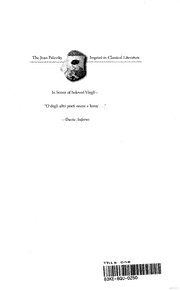Table Of ContentImprintinClassicalLiterature
—
InhonorofbelovedVirgil
“Odeglialtripoetionoreelume..
—
Dante,Inferno
Thi On©
The Poet and the Prince
The Poet
and the Prince
OvidandAugustan Discourse
Alessandro Barchiesi
UNIVERSITYOFCALIFORNIAPRESS
Berkeley • LosAngeles • London
—
Thepublishergratefullyacknowledgesthecontributiontothisbook
providedbytheJoanPalevskyEndowmentinClassicalLiterature.
UniversityofCaliforniaPress
BerkeleyandLosAngeles,California
UniversityofCaliforniaPress,Ltd.
London,England
Translation©1997bytheRegentsoftheUniversity
ofCalifornia
ThisbookisatranslationofIIpoetaeilprincipe:
Ovidioeildiscorsoaugusteo(Rome:Editori
Laterza,1994).©1993Gius.Laterza&FigliSpa,
Roma-Bari.
LibraryofCongressCataloging-in-PublicationData
Barchiesi,Alessandro.
[Poetaeilprincipe.English]
Thepoetandtheprince:OvidandAugustan
discourse/AlessandroBarchiesi.
p. cm.
Includesbibliographicalreferences(p. )and
indexes.
ISBN0-520-20223-6(cloth:al—k.paper).
1.Ovid,43B.C.-17or18a.d. Polit—icaland
socialviews. 2. Politicalpoetry,Latin History
andcriticism. 3. Augustus—,Emperor—ofRome,
63B.C.-14a.d. 4. Rome History Augustus,
30B.C—.—14A.D. 5. Politics—andLiterature
Rome History. 6. Rome In
literature. I. Title.
PA6537.—B28 1997
87i'.oi dc2i 96-49230
CIP
M9an8ufa7ctu6red5in4the3Uni2ted1StatesofAmerica
Thepaperusedinthispublicationmeetsthe
minimumrequirementsofAmerica—nNational
StandardforInformationSciences Permanence
ofPaperforPrintedLibraryMaterials,
ANSIZ39.48-1984.
huncegocumspectem,videormihicernereRomam
ExPonto2.8.19
credulitasnuncmihivestranocet
Amores3.12.44
Leroiestmort,viveleroi!
Frazer,TheGoldenBough
Contents
Acknowledgments ix
Introduction 1
PARTI.
ArmavirumqueintheMirroroftheBlackSea 13
PARTII.
OvidWritesRome 45
1. CalendarandPoeticForm 47
2. SyntagmaticTensions 79
3. ParadigmaticEffects 105
4. Genealogies 141
5. GuarantorsandSelf-DestroyingInformation 181
6. TheCausesandMessagesofRites: 214
RecuperationoftheAntique
7. TheSatyricElement 238
PARTIII.
TheEnd *51
Bibliography 273
Index 283
IndexLocorum 289
Copyrightedmaterial
Acknowledgments
AsIpresenttherevisededitionofIIpoetaeilprincipe(1994),itisstill
easyformetogo backintimeandacknowledgesomeformativeinflu-
encesonthebook.ButbeforeIthanksomeofmyinfluencesbynaming
them,Ifeelthatacoupleofmoregeneralremarkscanbehelpfultore-
construct(orconstruct)mygenealogy.First,Iwastrainedinclassicsat
Pisa (StateUniversityandScuola Normale) intheseventies: thiswasa
periodwhena studentworkingonRomanliteraturewouldperceivea
strongpolarizationbetween“formal”and“historical”interpretationof
literary texts. I hope the book will clarify what I mean by this. It is
enough to say that since then I have felt the need to experimentwith
readingsofclassicalpoetrythatcouldresistordisplaceortrespassany
fixed borderline between “form” and “history,” literatureandculture,
oreven “poetics”and“politics.”ThebookcamesimplybecauseIdis-
coveredonlylatelythatOvid’sFasti,andOvid’sworkingeneral,could
beafruitfulspaceofinquiryforsuchaproject. Boththeformal/struc-
tural tradition and the historicist tradition have been pursued in Italy
with great vigor and polemical engagement: my book can be read, I
think, asan attempttodismantlethe militarized frontierortoinhabit
a no-man’s-land. It is perhaps too detailed and formalistic for serious
historians, too preoccupiedwith thecultural contextformorerelaxed
philologists.
Second,tostartnowfromalessambitiousstatement,Imustconfess
anoldinterestinaminimalistproblemofinterpretation.EveryOvidian
IX
Copyrightedmaterial
—
X Acknowledgments
scholar could tell you that the fourth line ofMetamorphoses, admea
perpetuumdeducitetemporacarmen,isoneofthemosttantalizingmo-
mentsinthewholeofLatinpoetry.Perpetuum “continuous,”encapsu-
,
latesawholedebateaboutthenatureofthatpoemanditsgenre,struc-
ture,relationshiptomodels,andpoetics. Muchlessattentionhasbeen
paidtothefirstlineoftheFasti,TemporacumcausisLatiumdigestaper
annum andevenlesstotheimplicationsofdigesta “distributed,”“dis-
, ,
continuous.”So,ifperpetuumisviewedasakeytotheepicpoem,why
nottrydigesta asa meaningful descript—ion oftheelegiacpoem? Iwas
greatlyhelpedherebyaveryformalistic andthereforeintheendmore
—
than formal observation pointed out to me by Michael Reeve about
thetextualtransmissionoftheFasti.1FromthisI—begantolookforways
inwhic—hthemeaningofthepoemisconstituted inaculturalcontext,
Iguess throughitspeculiar,fragmented,andCallimacheanformat.
Ihaveupdated bibliographyandnoteswherepossibleandhavesys-
tematicallyrevisedthetext,butIhavenotincorporatedcommentsabout
publicationswhichappearedaftermybook.Somearequitecompatible
with my approach.2The book ofGeraldine Herbert-Brown, Ovidand
theFasti(Oxford 1994),isverydifferentfrommineandcouldgenerate
a fruitful dialogue, butin factmy book alreadyowes muchto a book
which belongs in the same categoryas Herbert-Brown’s: AugustoFra-
schetti,Romaeilprincipe(Roma-Bari 1990).IhavelearnedfromFra-
schetti’shistoricalmethodologyandtriedtocontrastsomeofhisread-
ings of Ovidian poetry. I have also learned much from the work of
AndrewWallace-HadrillandSimonPrice,especiallybecausethosenew
studiesofAugustanculturearediscouragingallofusfromviewingthe
literarytextsaseithersimply“oppositional”orsimply“orthodox”and
fromreadingpoetryasareflexofaprefabideology.3
1. Seebelow,p.103,andforacharacteristicallybriefassessment(onepage)byReeve
himself,inPecereandReeve1995,507-8.
2. SeeespeciallyNewlands1995;Krevans1997.
3. IrecommendthebalancedandfairdiscussionsofHerbert-Brown’sbook,together
withmine,byElaineFantham(1995)andPhilipHardie(1995).Ialsoreferbrieflytoan
importantpaperbyFergusMillar,“OvidandtheDomusAugusta”(1993).Millarteaches
ushowtouseOvidasawitnessoftheatmosphereofpoliticalchangeinthelateAugustan
aisntd”—Imppeerrhiaalpspebreicoadu,sebuttheIiadmeanaontdvethreywiomprrdesasreedsobyfohriesigdnestcoritphteiIotnaloifanOvtriaddiatsioan.“lHooyawl--
ever,itwillbeseenthatOvid’spoliticalideasarenotanimportantconcerninmyown
work.AndIcertainlywasveryimpressedandinfluencedbyMillar’spaperon“theimpact
ofmonarchy”(Millar1984).
AnothersurpriseafterthepublicationofmyItaliantext:givenmyinterestinOvid’s
versionofthedeathofRemus,itwasashocktodiscoverthatthisversionofthemyth
withthesurvivingbrotherexculpatinghimselfandlamentingthepoliticalhomicideasa
Copyrightedmaterial
Acknowledgments xi
Severalpeoplehelpedmeatdifferentstageswiththisbookand/orits
firstItalianversion: Leslie-Anne Crowley, a specialistofEnglishlitera-
ture at the University ofBrescia, who agreed to translate most ofthe
Italianoriginal,perhapsincommemorationofherclassicalbackground
atOxford;MarioDeNonno;FrancisDunn;AliceFalk;MarcoFantuzzi;
DenisFeeney;DonFowler;PhilipHardie;StephenHinds,whoshowed
methemanuscriptofhisfundamentalpaper,herecitedasHinds 1992;
PaulineHire;TomJenkins;MaryLamprech;AlessandroLaterza;Geor-
gia Nugent; Alessandro Schiesaro; and Charles Segal and the anony-
mousrefereesforthePress.4Grazie.
IquotetheFastifromtheTeubnertextofAlton,Wormell,andCourt-
ney (1985) and occasionally from the outstanding Englishtranslation
of Betty Rose Nagle (Bloomington 1995), a timely publication which
supportsandstimulatesarenewed interestinthepoemintheEnglish-
speakingworld.
Verona,Arezzo,andCambridge,Massachusetts,1995
—
deplorablemistake hadinfluencedaprimaryschooltextbookinthetimeofMussolini.
SoawholegenerationofItaliansweretaughthowtobeagoodFascistbyanelegiac
Romulus.
4. IalsothankmycolleaguesattheclassicsdepartmentinVerona,aswellastheclas-
sicistsattheUniversityofCambridge,whoinvitedmetoaninspiringLaurenceSeminar
ontheFastiinthesummerof1990.
Introduction
COINCIDENCES AND PROBLEMS
Thisbookisaboutanemperorandapoetwhoarealso,forourcontem-
poraryculture,EmperorandPoet,RegimeandArt.WhatImeanisthat
this subjecthas a sortofimplicitmagneticpolarity in it, which forces
everynewinterpreterintothepositionofhavingtochoosebetweenop-
posingfieldsandthustosaygood-byetohisorherownneutrality.IfI
trytoforgetforthemomentthatIamaphilologistandlookattheques-
tioninsteadthroughtheeyesofacontemporarystoryteller(orofmore
thanonecontemporarystoryteller),itwillbequickerandeasierforme
toretraceinyourcompanytheoriginsofthisparadox.
—
Itis p—robablya coincidence but perhaps itis an invitation to reread
Ovid thatinthe space ofa fewyears no fewerthanthreeinteresting
worksoffictionwithOvidastheirherohavebeenpublished.Theyare
notaboutOvidingeneral,butabouttheexiledpoetandhislifeinthe
gloomynewworldoftheBlackSea.1ThefirstoftheseisSognidisogni,
anairylittlestory,likeadreamorabutterfly.OneJanuarynightinTomi
the poet dreams (through Antonio Tabucchi) that he has been trans-
formedintoabutterfly.HeisbroughtbacktoRome,whereinaflutter-
ingdanceheofferstheemperorsomepoemswhichshouldwinbackhis
favor:butheisrejectedandscorned,hiswingsaretornoff,andheissent
i. Tabucchi1992;Ransmayr1988;Malouf1978.

